Hatred stirred by leaders blamed for rise in journalist murders: watchdog
Afghanistan is the most dangerous country for journalists, followed by Syria and Mexico
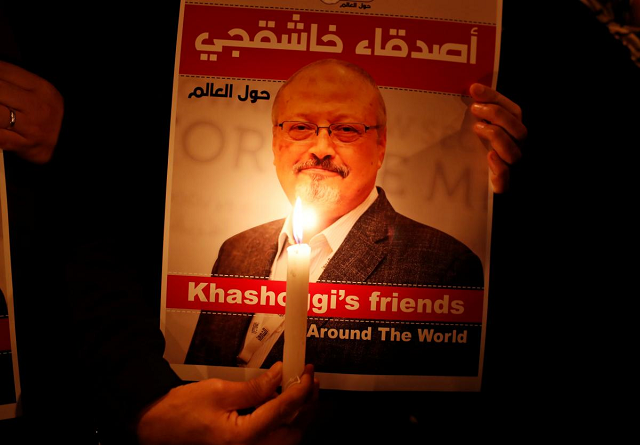
A demonstrator holds a poster with a picture of Saudi journalist Jamal Khashoggi outside the Saudi Arabia consulate in Istanbul, Turkey. PHOTO: REUTERS
Eighty journalists have been killed worldwide so far this year — most notably the Saudi columnist Jamal Khashoggi — with 348 in jail and 60 more held hostage, according to figures from Reporters Without Borders (RSF).
"Violence against journalists has reached unprecedented levels this year, and the situation is now critical," said the organisation's head, Christophe Deloire.
"The hatred of journalists sometimes very openly proclaimed by unscrupulous politicians, religious leaders and businessmen... has been reflected in this disturbing increase," he said.
RSF did not directly point the finger at US President Donald Trump, who regularly rails against journalists and has branded some "enemies of the people".
But Deloire said, "expressions of hatred legitimise violence, thereby undermining journalism and democracy itself."
The US also became the fifth deadliest country in the world for reporters in 2018 after the shooting of five people at the Capital Gazette newspaper in Maryland in June.
DEAD & FORGOTTEN: Odds against journalists to get justice in Pakistan
Afghanistan was the most dangerous country for journalists, with 15 killed including AFP's Shah Marai, followed by Syria with 11 deaths and Mexico with nine.
Deloire said the hate stirred up against journalists is "amplified by social networks, which bear heavy responsibility in this regard."
"Murders, imprisonment, hostage-taking and enforced disappearances have all increased," he said, with the death toll of professional journalists up 15 per cent after three years of a falling casualty rate.
"Journalists have never before been subjected to as much violence and abusive treatment as in 2018," Deloire said.
The murders of Khashoggi in the Saudi embassy in Istanbul and the young Slovak data journalist Jan Kuciak and his girlfriend "highlighted the lengths to which press freedom's enemies are prepared to go," he said.
Khashoggi's murder in October caused an international outcry and showed the extremes to which "some people will go to silence 'troublesome' journalists", RSF said.
Journalists in Asia remain under threat
More than half of the journalists killed were deliberately targeted, the other 31 were caught in the violence.
The RSF report said the number of non-professionals killed almost doubled from seven in 2017 to 13 this year.
It said citizen journalists now played a key role in helping get news from countries at war or with oppressive regimes, "where it is hard for professional journalists to operate."
The overall toll does not include 10 deaths of media workers that the RSF said it was still investigating.
China continues to be the world's top jailer of journalists, the report said, with 60 behind bars, 46 of them non-professional bloggers, some of whom are held in "inhuman conditions for nothing more than a post on social networks."
The report also condemned "Turkey's despotic regime" for the "Kafkaesque trials in which journalists are accused of terrorism on the basis of a single word or phone contact."
With 33 journalists behind bars, it has more professional reporters incarcerated than any other country despite a fall in the number in prison.
The sentencing of three journalists aged 65, 68 and 74 to "aggravated life sentences... under the severest form of isolation, with no possibility of a temporary release or a pardon" was inhuman, it added.
Egypt and Iran also made the blacklist of the worst offenders with 38 and 28 reporters and bloggers in prison respectively.
The RSF condemned Egypt for the opaqueness of its military justice system, saying 30 reporters in detention had not been tried and others are still held even after the courts ordered their release.


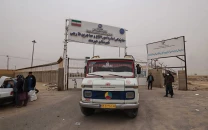
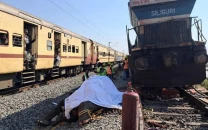
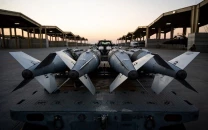
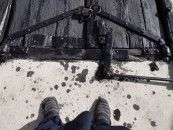
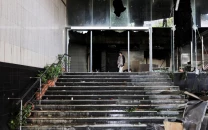
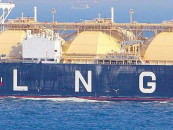



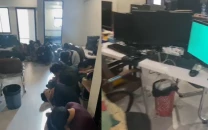







COMMENTS
Comments are moderated and generally will be posted if they are on-topic and not abusive.
For more information, please see our Comments FAQ